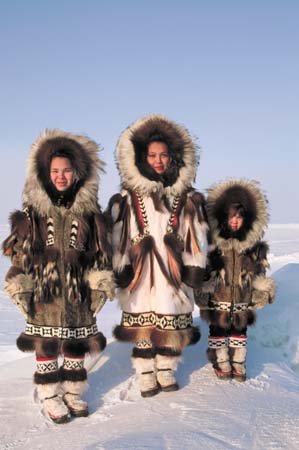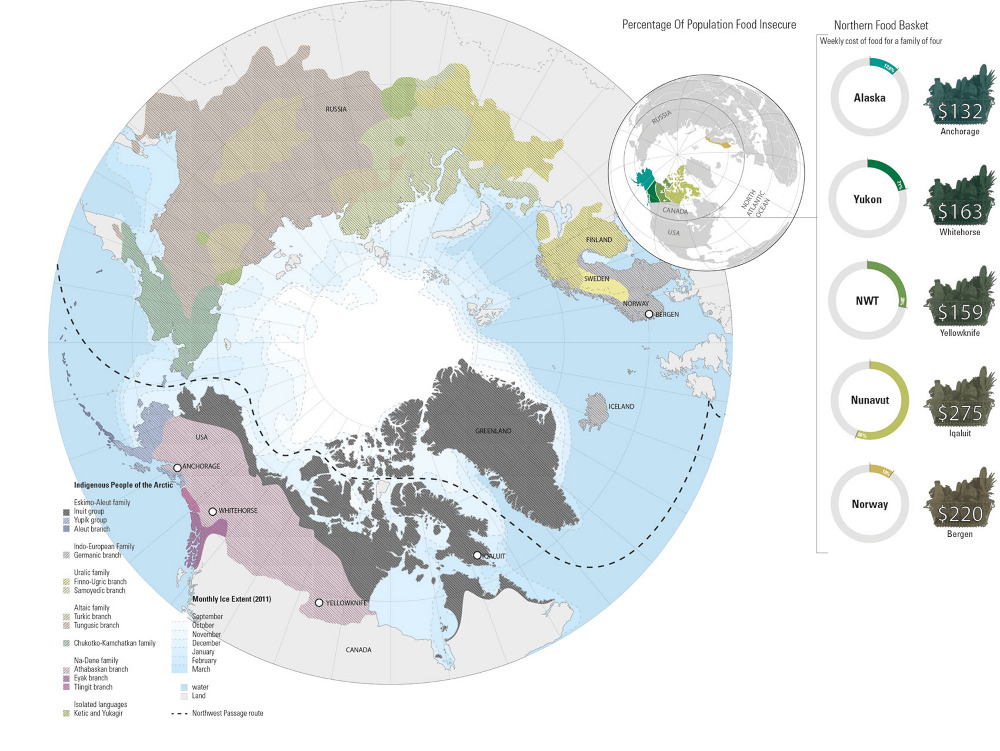- Jan 25, 2009
- 19,765
- 1,428
- Faith
- Oriental Orthodox
- Marital Status
- Private
- Politics
- US-Others
Shalom
I was writing on this due to how it seems that there has been little to no coverage by U.S media outlets on an issue that our nation is helping to cause up North - specially as it concerns the food security to the Inuits (also called Eskimos, associated with Igloos) and the ways we're helping to kill them off. I had to do report on it for another organization I'm with - but I was wanting to see what others had to say on the matter here...as it's a big deal. Oprah Winfrey did a show on the issue some time back - and it was amazing to see how many were surprised at the struggles going on for families/parents in the Eskimo situation.

Artic Food Networks are very diverse and delicate systems. Many are unaware of the fact that things such as shrinking of ice (due to global warming/gas house emissions - of which U.S electrical companies play a big part) and the industrialization of civilization near Inuit communities - known to often be isolated and sustainable due to the aspect of low contact with industrialization - have caused severe damages in their food supply. Additionally, some Inuit believe climate change could bring about a "cultural genocide" as their hunting way of life melts with the sea ice...and with even plant supplies being a concern since many rely on them.

As a result, many are starving - with the markets they go to for food having products be placed at such high rates that they are no affordable ...as it costs more to get food to the North and the prices are far higher than they are in the South.
Many have turned to protesting in order to get recognition of their struggle. In example, there have been many legal battles occuring over the use of water supplies and getting the U.S government to respect the right of Natives in their land. Also, years ago, Earthjustice attorneys and the Center for International Environmental Law (CIEL), working with the Inuit Circumpolar Conference submitted a petition to the Washington DC-based Inter-American Commission on Human Rights seeking relief from violations of the Inuit's human rights resulting from global warming caused by greenhouse gas emissions from the United States. The Commission, which was created in 1959 by the Organization of American States, has a long and distinguished history of protecting human rights, particularly those of indigenous peoples. For the United States makes up only five percent of the world's population, but emits one-quarter of global greenhouse pollution...and the petition called on the United States to respect its human rights obligations and take effective action to immediately reduce its contribution to the Inuit's injuries (more shared here)...with many noting the wisdom found in the ways of life (including diet) that the Inuit hold strongly to.
Nonetheless, there is still a gross lack of help occurring for those Eskimo communities that have been harmed by the damage that we in the U.S have been doing to their environment. This has already occurred historically when it came to the U.S simply choosing to Relocat Northwest Alaska Eskimos, from 1907-1917....damaging their environment and forcing them to adapt to what those for expansion wanted..even though in Alaska, white settlement denied some natives their choice of seasonal camps, mining fouled some fish habitat, and newcomers competed with natives for fish and game (although the taking of game and fish and the gathering of roots and berries still provided many of the essentials for Alaskan Eskimo, Aleut, and Indian people).
Sadly, it seems the same is STILL occurring. If anyone has heard on this issue, what are you thoughts? How should the U.S best go about helping others out on the situation - and why is it not being discussed?
I was writing on this due to how it seems that there has been little to no coverage by U.S media outlets on an issue that our nation is helping to cause up North - specially as it concerns the food security to the Inuits (also called Eskimos, associated with Igloos) and the ways we're helping to kill them off. I had to do report on it for another organization I'm with - but I was wanting to see what others had to say on the matter here...as it's a big deal. Oprah Winfrey did a show on the issue some time back - and it was amazing to see how many were surprised at the struggles going on for families/parents in the Eskimo situation.

Artic Food Networks are very diverse and delicate systems. Many are unaware of the fact that things such as shrinking of ice (due to global warming/gas house emissions - of which U.S electrical companies play a big part) and the industrialization of civilization near Inuit communities - known to often be isolated and sustainable due to the aspect of low contact with industrialization - have caused severe damages in their food supply. Additionally, some Inuit believe climate change could bring about a "cultural genocide" as their hunting way of life melts with the sea ice...and with even plant supplies being a concern since many rely on them.

As a result, many are starving - with the markets they go to for food having products be placed at such high rates that they are no affordable ...as it costs more to get food to the North and the prices are far higher than they are in the South.
Many have turned to protesting in order to get recognition of their struggle. In example, there have been many legal battles occuring over the use of water supplies and getting the U.S government to respect the right of Natives in their land. Also, years ago, Earthjustice attorneys and the Center for International Environmental Law (CIEL), working with the Inuit Circumpolar Conference submitted a petition to the Washington DC-based Inter-American Commission on Human Rights seeking relief from violations of the Inuit's human rights resulting from global warming caused by greenhouse gas emissions from the United States. The Commission, which was created in 1959 by the Organization of American States, has a long and distinguished history of protecting human rights, particularly those of indigenous peoples. For the United States makes up only five percent of the world's population, but emits one-quarter of global greenhouse pollution...and the petition called on the United States to respect its human rights obligations and take effective action to immediately reduce its contribution to the Inuit's injuries (more shared here)...with many noting the wisdom found in the ways of life (including diet) that the Inuit hold strongly to.
- The Inuit Paradox | DiscoverMagazine.com
- Climate Change Litigation Inuit v. the U.S. Electricity Generation ...
- An Inuit Petition to the Inter-American Commission - The Center for Human Rights Violations
IN THE LAST DECADE or SO, some North Americans have begun to alter dramatically their relationship to the food they eat and those that produce it. Spurred in part by Michael Pollan's The Omnivore's Dilemma, a wildly popular defence of local and "do it yourself" forms of food production, or Alisa Smith and J.B. Mackinnon's The 100-Mile Diet, many so-called locavores have joined Community Supported Agriculture (CSA(1), developed community gardening projects, or packed local farmers' markets on Saturday mornings. The motivations that propel the embryonic local food movement are various, for some likely not much more complicated than their desire for extra-fresh rapini. For others, however, the heart of the local food movement lies with resistance to the idea that food is primarily a corporate commodity. Instead, the production and consumption of food represents an affirmation of the bond between farmer and eater, one of the profound building blocks upon which we build human communities and more sensitive relationships to the natural world.
For those who are Inuits, being able to stay connected to the land and having the ability to be included in the markets are of high importance. And it is a blessing to be able to achieve those goals via agriculture/community gardening. Even as it concerns health issues such as type 2 diabetes (a result of lack in food security), First Nations and Inuit communities are encouraged to develop innovative, culturally relevant approaches aimed at increasing community wellness so that certain things will be less of a burden. In specific, community activities funded through the ADI (the Aboriginal Diabetes Initiative ) vary from one community to another, and may include community gardens - as well as walking clubs, weight-loss groups, diabetes workshops, fitness classes, community kitchens and healthy school food policies.
Nonetheless, there is still a gross lack of help occurring for those Eskimo communities that have been harmed by the damage that we in the U.S have been doing to their environment. This has already occurred historically when it came to the U.S simply choosing to Relocat Northwest Alaska Eskimos, from 1907-1917....damaging their environment and forcing them to adapt to what those for expansion wanted..even though in Alaska, white settlement denied some natives their choice of seasonal camps, mining fouled some fish habitat, and newcomers competed with natives for fish and game (although the taking of game and fish and the gathering of roots and berries still provided many of the essentials for Alaskan Eskimo, Aleut, and Indian people).
Sadly, it seems the same is STILL occurring. If anyone has heard on this issue, what are you thoughts? How should the U.S best go about helping others out on the situation - and why is it not being discussed?
Last edited:


